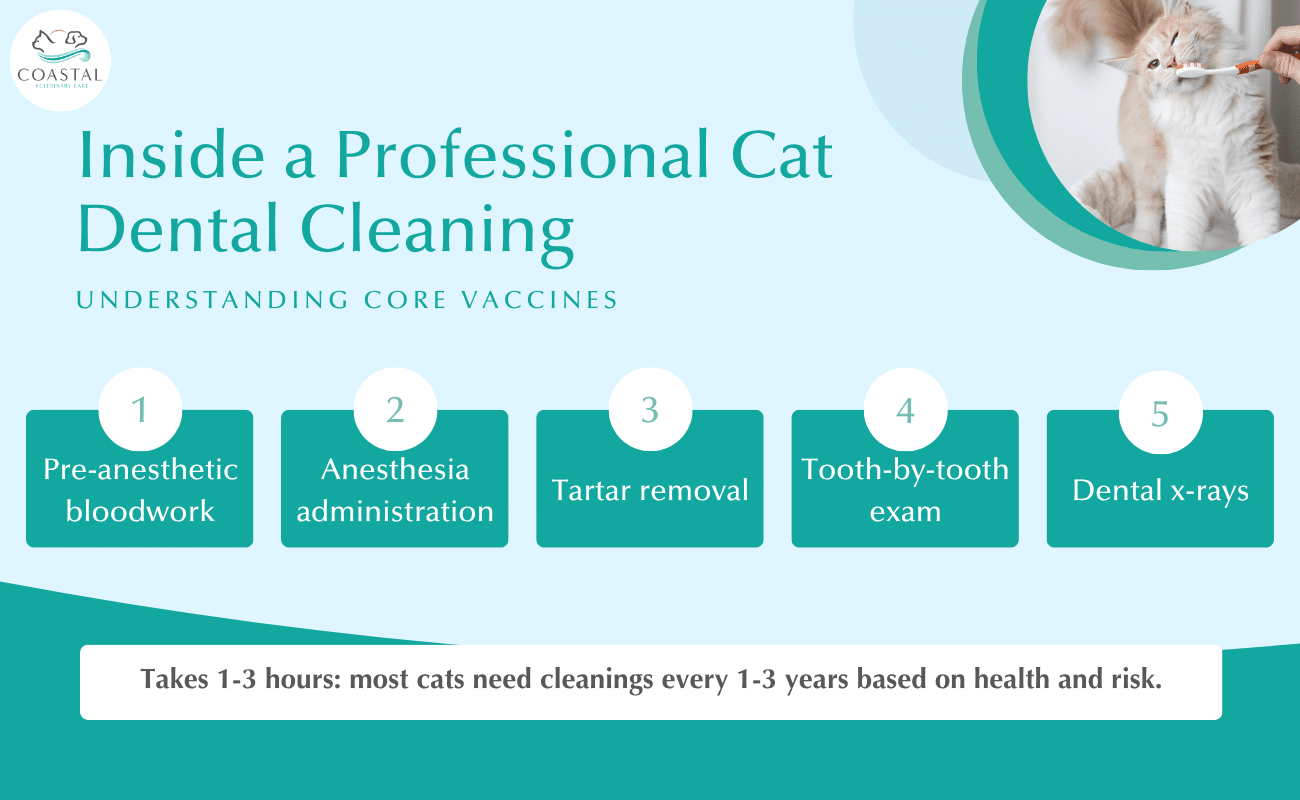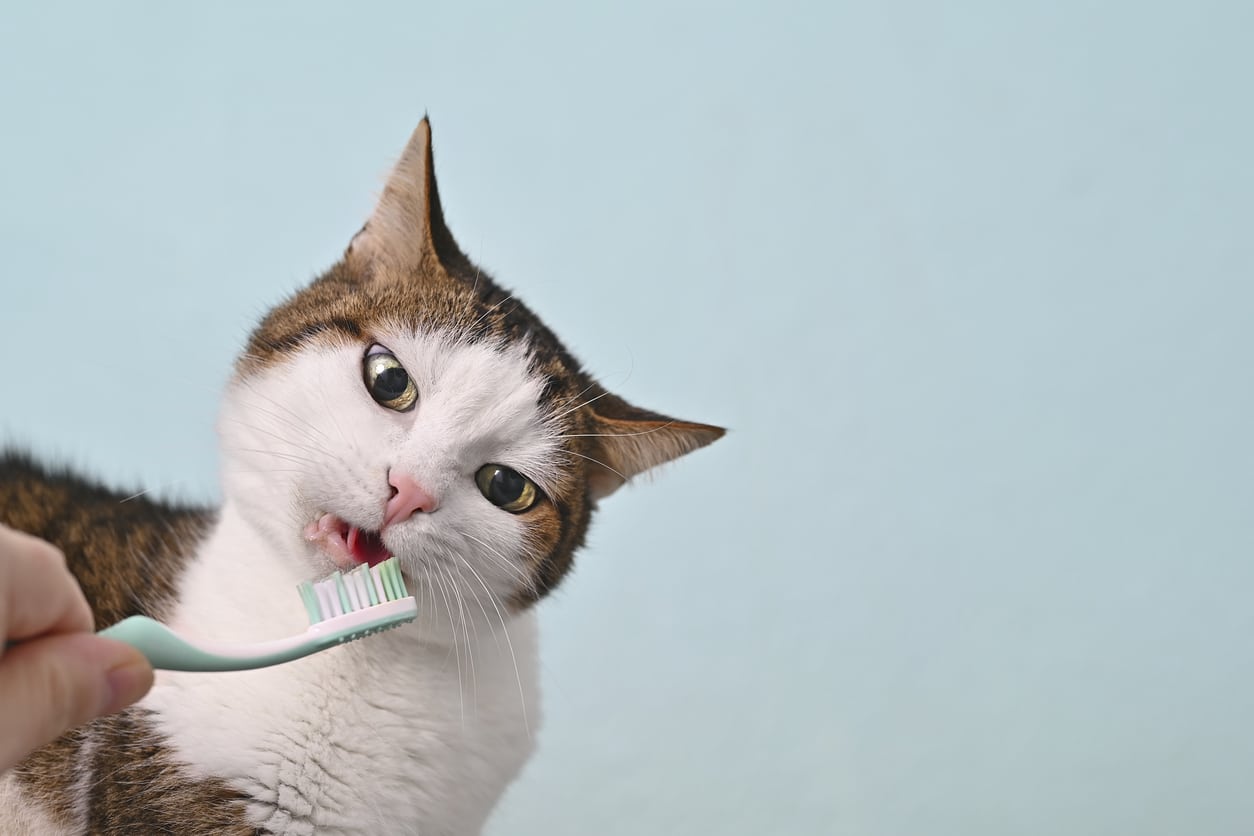Do Cats Need Dental Cleaning? Everything Cat Owners Should Know
The short answer: Yes, cats do need dental cleaning, and it’s more important than most pet owners realize.
When you think about your cat’s health, dental care might not be the first thing that comes to mind. But here’s something that might surprise you: most cats develop dental disease when they’re just three years old. Unlike dogs, who might show obvious signs of dental problems, cats are masters at hiding their pain, which means dental issues often go unnoticed until they become serious.
The truth is, your cat’s teeth need as much attention as their regular vaccinations and checkups. Poor oral health doesn’t just cause bad breath – it can lead to tooth loss, painful infections, and even affect your pet’s heart, liver, and kidneys. Understanding why dental cleaning matters and what you can do about it could make a huge difference in your cat’s quality of life.
The Hidden Impact of Cat Dental Health
Your cat’s oral health plays a larger role in their overall well-being than most pet owners realize. When bacteria build up along the gum line, it doesn’t just stay in your pet’s mouth. These harmful bacteria can enter the bloodstream and travel to vital organs, potentially causing serious health complications.
The most obvious signs that something’s wrong include:
-
- Bad breath: While “cat breath” might seem normal, consistently foul-smelling breath often indicates dental problems
- Difficulty eating: Trouble with hard food or eating more slowly than usual
- Pawing at the face: Excessive touching or scratching around the mouth area
- Drooling: More saliva than normal, especially if it’s bloody or discolored
- Head shy behavior: Reluctance to let you touch their head or mouth area
What makes dental issues particularly challenging with cats is their incredible ability to hide discomfort. In the wild, showing weakness could mean becoming prey, so cats have evolved to mask pain extremely well. Your cat might be suffering from significant dental problems while still eating, playing, and acting relatively normal. This is why regular dental exams are so crucial – your veterinarian can spot issues that aren’t obvious to pet owners.
Common Cat Dental Problems
Just like humans, cats can develop several different types of dental problems that affect their comfort and overall health. Understanding these common conditions can help you recognize when your cat needs professional dental care.
Periodontal Disease
The most common dental issue affecting cats is periodontal disease, which starts when plaque buildup along the gum line hardens into tartar. This tartar irritates the gums, causing inflammation and eventually leading to more serious problems if left untreated.
Plaque buildup begins forming within hours after your cat eats. When this sticky film isn’t removed through brushing or natural chewing action, it calcifies into tartar which can only be removed through professional dental cleaning. As tartar accumulates, it pushes against the gums, creating pockets where bacteria thrive.
Tooth Resorption
Another serious condition that affects many cats is tooth resorption, where the tooth structure gradually dissolves from the inside out. This painful condition can cause significant discomfort, but cats often continue eating despite the pain. Tooth decay, while less common in cats than in humans, can still occur and lead to tooth extraction if not addressed promptly.
Risk Factors
Some cats develop more severe dental problems than others due to several factors:
-
- Age: Older cats typically require more frequent dental care
- Diet: Cats who eat primarily soft food may experience more plaque buildup than those who crunch on dry kibble
- Genetics: Some breeds are predisposed to certain dental issues
- Overall health: Cats with compromised immune systems or other health conditions face a higher risk

Professional Dental Cleaning: What Happens
A professional dental cleaning at your veterinary clinic is far more comprehensive than what you might imagine. The procedure requires general anesthesia to ensure your cat’s safety and allow for thorough examination and cleaning of every tooth.
The dental procedure involves several key steps:
-
-
- Pre-anesthetic bloodwork: Your veterinarian ensures your cat is healthy enough for the procedure
- Anesthesia administration: Your cat is safely placed under general anesthesia for their comfort and safety
- Tartar removal: Using an ultrasonic scaler, the veterinary team removes tartar buildup both above and below the gum line
- Individual tooth examination: Each tooth is carefully examined for signs of damage or disease
- Dental X-rays: Often taken to check for problems below the gum line that aren’t visible during a regular exam
- Tooth extraction, if needed: If diseased teeth are discovered, extraction may be necessary to prevent further pain and infection
-

The entire dental procedure typically takes one to three hours, depending on your cat’s individual needs. Most cats need professional cleanings every one to three years, though some may require more frequent cleanings based on their risk factors and oral health status.
What You Can Do at Home to Help
While professional dental cleaning is essential, daily brushing at home can significantly extend the time between professional cleanings and improve your cat’s overall dental health. Yes, you can brush your cat’s teeth – it just takes patience and the right approach.
Starting a Brushing Routine
Getting your cat comfortable with tooth brushing takes patience and a gradual introduction:
-
- Start with gentle mouth touching and introduce pet-safe toothpaste (never use human toothpaste)
- Touch teeth and gums with your finger, then use a soft-bristled pet toothbrush when ready
Making Brushing Successful
The key to successful regular brushing is making it a positive experience:
-
- Keep sessions short and use praise and rewards
- Start with just a few teeth and brush a few times weekly to prevent plaque buildup
Additional Home Care Options
Beyond brushing, other tools can support your cat’s dental health:
-
- Dental treats: Can help reduce tartar formation through mechanical cleaning action as your cat chews
- Dental diets: Specially formulated foods that promote oral health, though they shouldn’t replace regular brushing or professional cleanings
Interactive toys that encourage chewing can provide some natural cleaning action, though cats typically don’t chew as vigorously as dogs, making them less effective for dental health.
When to Call Your Vet Right Away
Certain symptoms indicate that your cat needs immediate veterinary attention for dental issues. Watch for these warning signs:
-
- Severe bad breath: Suddenly worsening or extremely foul odor
- Facial swelling: Visible swelling around the face or jaw area
- Bleeding from the mouth: Any blood in saliva or around the mouth
- Difficulty eating: Obvious trouble chewing or refusing food entirely
- Excessive pawing: Repeatedly scratching or pawing at the mouth area
- Reluctance to eat hard food: Avoiding kibble or treats they previously enjoyed
These symptoms could indicate a dental abscess or other serious dental issue requiring urgent treatment. The earlier dental problems are caught, the easier and cheaper they are to treat. What might require a simple cleaning and minor dental work in the early stages could progress to requiring multiple tooth extractions and oral surgery if left untreated.
Most veterinarians recommend annual dental exams as part of your cat’s regular healthcare routine. During these exams, your vet can assess your pet’s oral health and recommend appropriate timing for professional dental cleaning.

Keeping Your Cat’s Smile Healthy in Myrtle Beach
Understanding your cat’s dental needs is one of the most important steps you can take as a pet owner. Regular dental care – both at home and through professional cleanings – can prevent painful dental disease, tooth loss, and serious health complications.
The combination of daily brushing, appropriate dental treats, annual dental exams, and professional cleanings when recommended provides the best protection for your cat’s oral health. While the initial investment in dental care might seem significant, it’s far less expensive than treating advanced dental disease or managing the health complications that can result from poor oral health.
At Coastal Veterinary Care, we’re committed to helping Myrtle Beach pet owners maintain their cats’ dental health through every stage of life. Whether your cat needs their first dental cleaning or you want to start a prevention routine, our experienced team can guide you through the best approach for your feline family member. Don’t wait until dental problems become painful and expensive to treat – contact us today to discuss your cat’s dental health needs.
Choose Coastal Veterinary Care in Myrtle Beach, SC
At Coastal Veterinary Care, we can help you determine an appropriate veterinary schedule that best supports your pet’s needs. From planning regular routine visits to understanding what to look for to identify when your pet may need to be seen to evaluate a specific injury or illness, we are here to help you make sure your pet gets the best possible care. Contact us today to learn more about why we are a trusted choice among pet owners in the Myrtle Beach, SC, area or to schedule an appointment!
